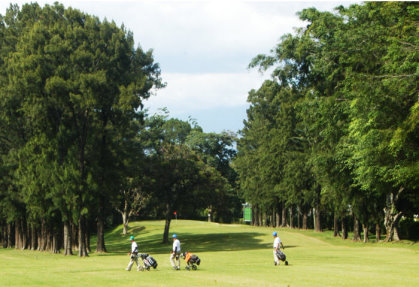
Since golf’s introduction to Costa Rica in 1940 Costa Rica Country Club (CRCC) has been at the forefront of the game in the region. It continues to show strong leadership strengthening the game through pioneering sustainable management and has now reached a new milestone in becoming the first club in Latin America to become recertified to golfs international sustainability mark GEO Certified®
CRCC first become GEO Certified® in 2012 and having shown continued commitment and improvement during the three-year certification cycle the club has now become re-certified. GEO Certified®, golf’s international eco-label, recognizes golf facilities which demonstrate a continued commitment to protecting and enhancing nature, using resources efficiently and providing added value to their community. In becoming re-certified CRCC have shown their ongoing commitment and continuous improvement across sustainable management of the club and course. GEO Certified® is administered by GEO (The Golf Environment Organization) the not-for-profit organization dedicated to supporting global sustainable golf, and is verified by an independent auditor.
Kenneth Thome, President Board of Directors CRCC, said, “Managing our club in a sustainable manner is something which we value and promote as an organization, as it benefits our members, the local community and the global environment. Becoming GEO re-Certified credibly recognizes our work to date and demonstrates our ongoing commitment. We are very proud to have achieved this.”
The club was particularly praised within the GEO re-Certified report, submitted by the independent verifier. For its ambitious non-native tree replacement carbon sequestration strategy. The club is committed to replacing 340 non-native trees in the next six years with native species more suited for the climate and that provide food and shelter to fauna. Further highlights of the clubs ongoing work across nature, resource efficiency and community value include:
- 85% of the club’s energy consumption comes from renewable sources;
- 50% of main use lighting has been replaced with energy efficient LEDs, with a target to reach 100% in the near future;
- Detailed soil, plant, and water analysis is carried out to accurately design and implement the turf fertiliser and pesticide programme;
- Purchasing policies which promotes local suppliers and energy efficient appliances have led to the use of 50% of products containing recycled matterial, plans are also in place to work only with ISO 14001 accredited suppliers;
- A sustainable waste management system is in place and regular waste audits take place, recyclable waste is donated to a local NGO to help them to fundraise;
- Close community links including provision of food storage for a local foster home and internships for local students.
B.K. Singh, and Johan Perret, Professors at local Earth University said “This distinction demonstrates CRCC’s work and commitment to sustainability, not only over the three years since they were first GEO Certified but also looking forward to the future.”
Prof. Singh, who is involved in the sustainability programme at the club continues: “The OnCourse® programme was of great help in allowing us to recognize where sustainable goals had been achieved and where improvements were needed. It supports our work plan and priority-setting, guides our best practice in sustainable golf, and ultimately enhances our ability to embed cost-effective, climate-resilient practices in every day work.”
Jonathan Smith, Chief Executive of GEO, said, “In becoming GEO Re-Certified CRCC have once again shown strong leadership in strengthening golf in Latin America. Through their active commitment to sustainable development they are demonstrating the benefits golf can bring to the local environment and communities, enhancing the value of the game in the region. We congratulate them and look forward to seeing them continue to strive forward.”
More information about sustainable golf, OnCourse® and GEO Certified®, along with both full GEO Certified® verification reports for CRCC can be found at www.golfenvironment.org

